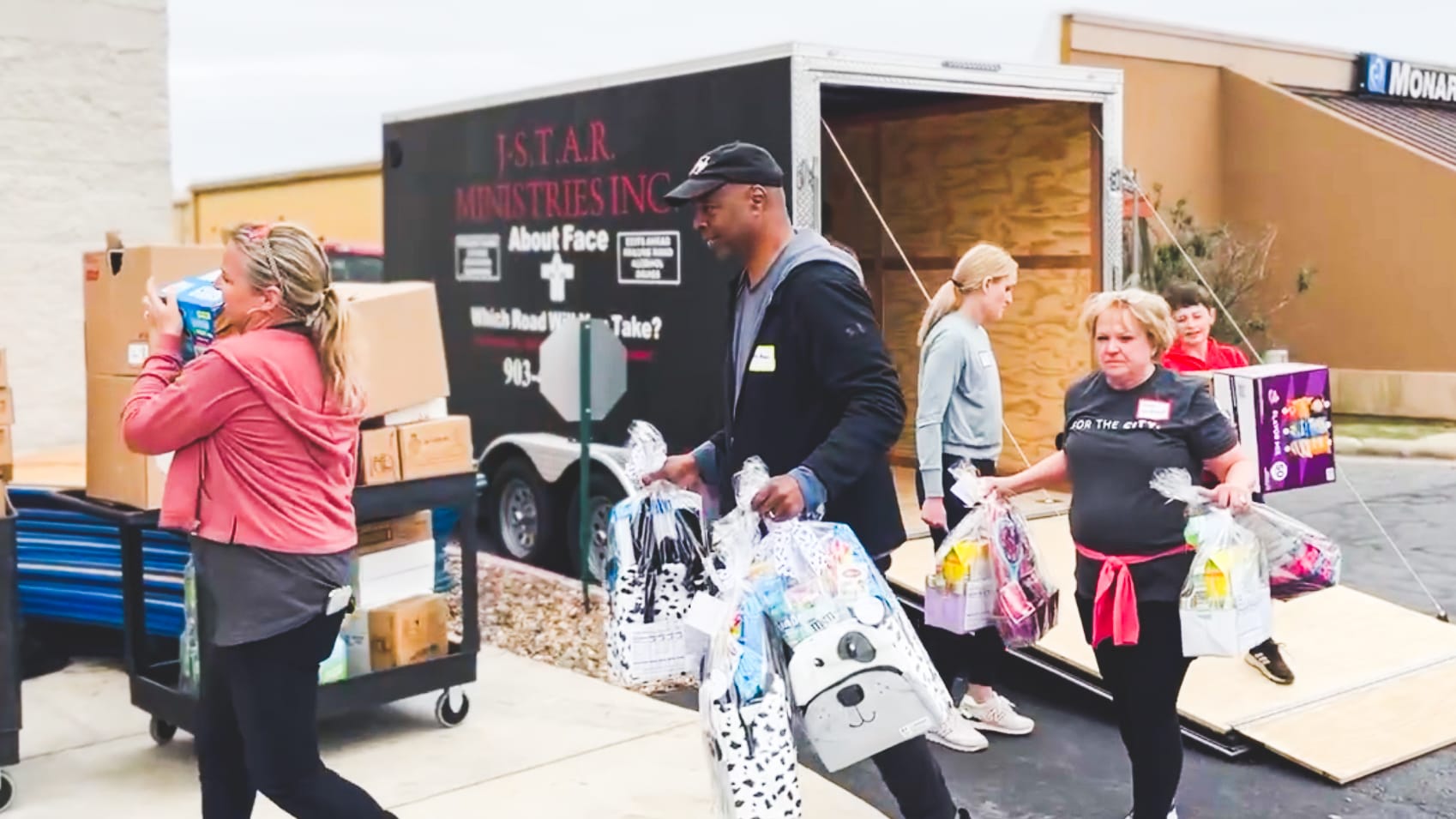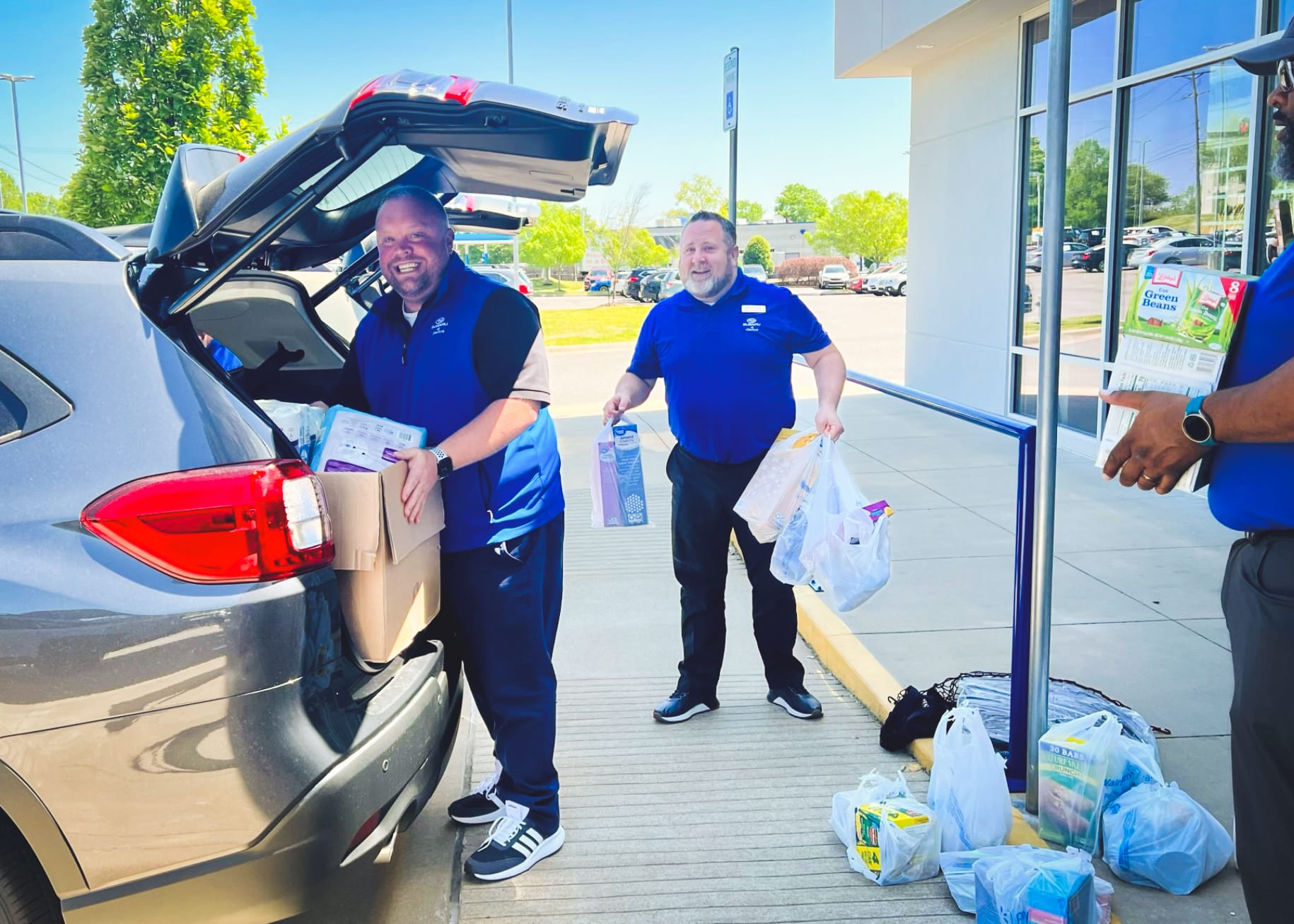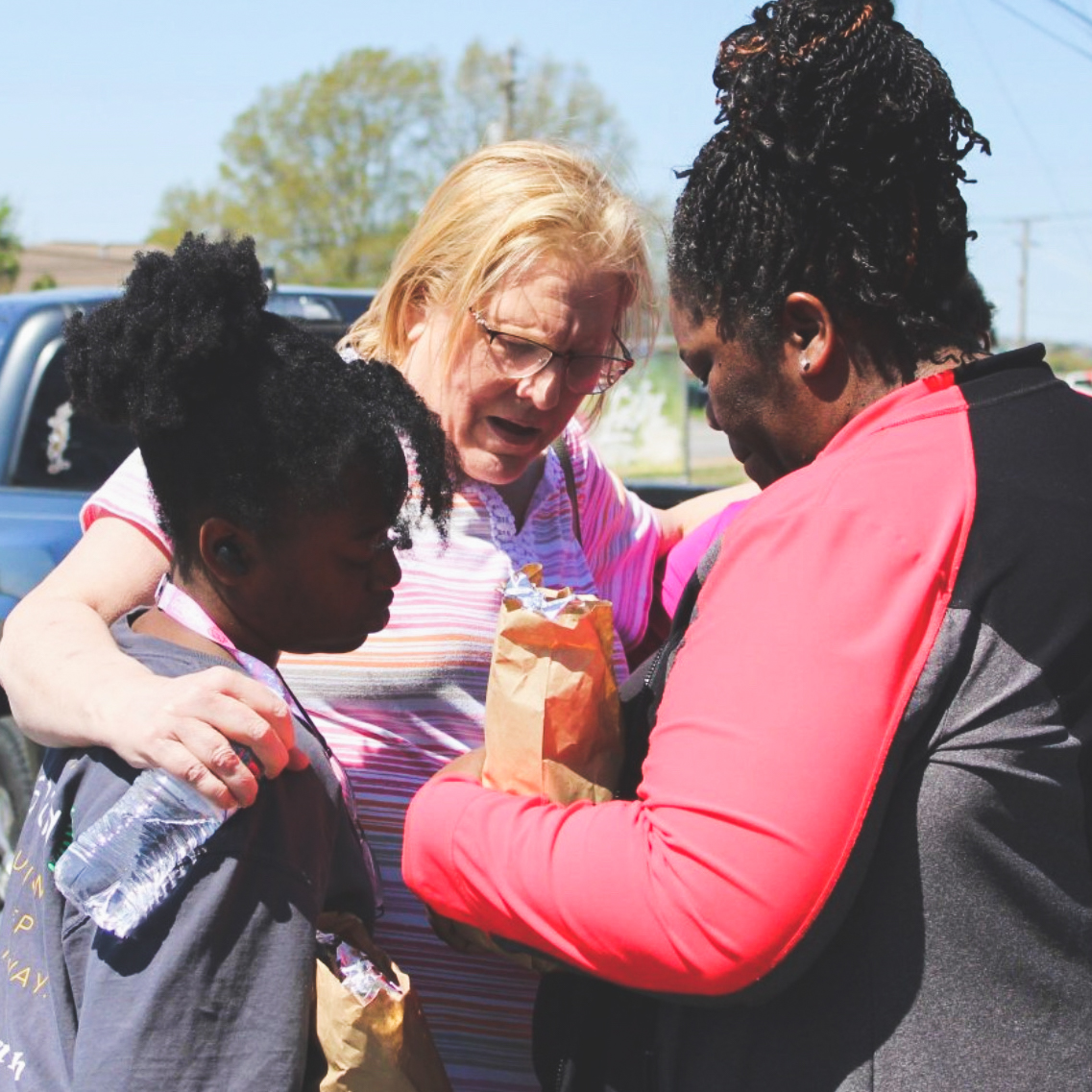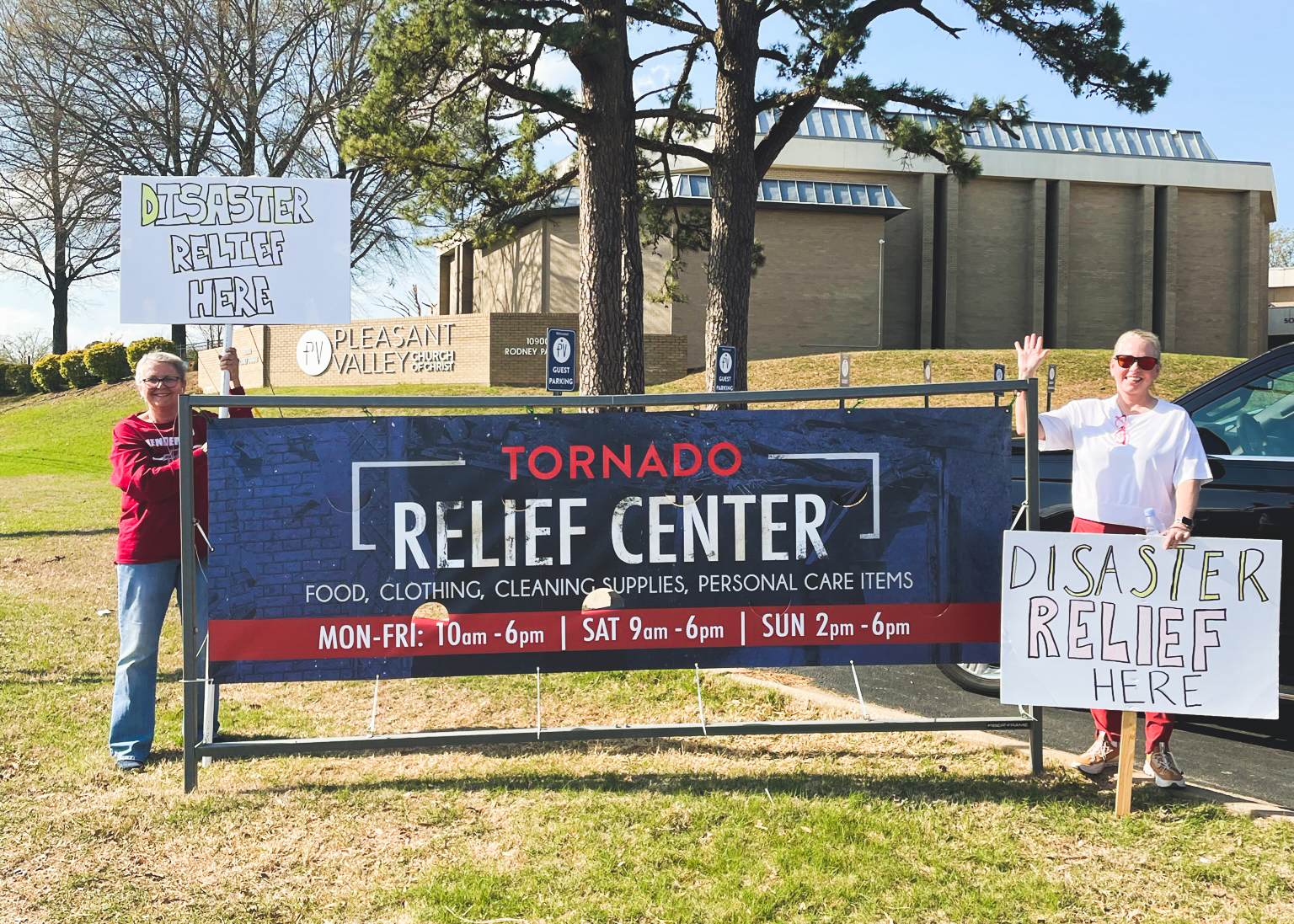Loving Our Neighbors
In the afternoon on March 31st, Matt Hubbard got a message that one of the church’s food pantry freezers had gone out. For Immanuel Baptist Church’s Missions Pastor, this was not unusual for him. The rest of Matt’s day, however, would be anything but typical. He went to City Center, Immanuel’s community center containing food pantries, a clothes closet, a dental clinic, a prayer room, and more. He helped move food to another freezer and noticed that the sky outside was ominously dark. Matt knew a storm was coming, but he didn’t know then that storm would forever change his life and countless others throughout Central Arkansas and the state.
From there Matt went to Starbucks on Rodney Parham to get some work done. Just after he ordered his standard flat white, Matt looked out the window and saw clouds beginning to swirl. “That is not a good sign,” he thought. He stepped outside to take a closer look. As he stared across Green Mountain Drive, he saw power flashes from transformers and debris flying in the air. Then he saw it – a tornado barreling toward him, leaving complete destruction in its wake.
The tornado toggled just enough to miss the Starbucks by only 150 yards. Matt’s immediate concern was for his family. Were they okay? He called his wife, and they were safe. Matt’s concern then shifted to the church’s two mission houses on Breckenridge, one of which housed a missionary family from South Africa with a quadriplegic daughter. He called and called, but there was no response. Matt drove to check on them and the other house but was blocked by utter chaos. Traffic was gridlocked. The roads were littered with the debris of fallen trees and power lines. Gas and water manes had burst. He couldn’t get through by car, so he tried to go in on foot. Eventually, a teenager showed him a path in. By God’s grace, the missionaries weren’t home when the tornado came through. They were at a doctor’s appointment and out of harm’s way.

Making the Transition
From there, Matt returned to City Center and met with the facilities team. Nothing could have prepared them for that moment. “I’m a missions pastor and was a student pastor for years,” Matt told me. “I’ve never been through something on this scale. We had no great plan. We simply thought, ‘What’s the next step? What do we need to do?’” Later that evening, leadership met to discuss what relief efforts would look like.
City Center soon became a deployment center for the city’s first responders. Southern Baptist Disaster Relief, the world’s second-largest disaster relief organization, sent volunteers in chainsaw crews, mud-out teams, and feeding and shower units. 150 volunteers from Texas and Oklahoma also came to help. In the days that followed, City Center was operating as one of the main centers of the city’s relief efforts.
Eventually, City Center transitioned from a deployment center to a relief center. Believers at Immanuel needed to find a way to scale up their efforts and do it quickly. Little Rock’s mayor even asked Immanuel if they could be a family assistance center for the city. In the immediate aftermath of the tornado, someone connected to Amazon asked Matt what they needed. Food, water, tarps, diapers, cardboard boxes, you name it. It was all needed, and lots of it. Two days after the tornado, Matt got an unexpected call from someone who needed to use the loading bays at the church. The first of fifteen semi trucks from Amazon had arrived at the church, filled with the requested supplies.
In just a couple of days, City Center and the church’s staff and volunteers were transformed. Katie, Immanuel’s skilled Pre-School Director, became Volunteer Coordinator. Two staff members from the youth ministry collected work orders for specific needs in the community. Rusty, Immanuel’s Legacy Adult Pastor, organized the supply line of items going out. Retirees who usually volunteered 4-5 hours a week at City Center served multiple 9-10 hour shifts. They say, “It takes a village,” and a sizable village of volunteers was needed to respond to the overwhelming needs of the community.
The Recovery Phase
In just two weeks of giving family assistance, over 200 volunteers at City Center clocked in over 15,000 volunteer hours. Many were from Immanuel, but others were from other churches, businesses, and neighbors off the street. These volunteers served over 7,000 families, many living through their darkest hour, having lost everything but their lives. When called to act, these volunteers loved their neighbors like Jesus.
Immanuel’s relief efforts are ongoing, but Matt understands they are entering a new phase in ministry and outreach – recovery. What exactly does that look like? Matt and his team are learning and listening to the immediate and long-term needs of neighbors in their community and beyond to figure that out. They want to help people find restoration, physically and spiritually. “We want people to recover and be restored, but, ultimately, we want them to be restored to Jesus. We want them to build new homes on the foundation of Jesus.”
When asked where he sees God working in this tragedy, Matt told me:
In the midst of the devastation, tragedy, and loss caused by the tornado, God wanted to be made known as a God of grace, love, and mercy. And he has shown that to both victims of this tragedy and volunteers.

The Church Responds
On the afternoon the tornado touched down, Jimmy Cone was at a meeting in Searcy. He started getting texts and calls because the church where he serves as an elder, Pleasant Valley Church of Christ, was within a quarter mile of the tornado’s path. Before Jimmy left Searcy, one of the leaders from the meeting told him, “A group in Nashville contacted me. They’ll provide whatever you need if you make the church a relief center.” On the heels of that promise, the first steps were taken to turn Pleasant Valley Church of Christ into a relief center.
Later that evening, the church decided to mobilize a small army of volunteers to go out into neighborhoods on Saturday in the church’s community to help in the relief efforts. From dawn to dusk on Saturday, volunteers walked through the areas damaged by the storm, asking where people needed help. The roof of a 99-year-old woman living in Cammock Village had been damaged. Volunteers swarmed the woman’s house and helped repair the roof. The woman’s neighbor, a skeptic for many years regarding anything Christian, told them, “Now I get it.” Arguments didn’t sway this neighbor, but something about the loving response of those believers for this woman did.
Jimmy got a huge surprise on Sunday morning when droves of people, many of whom would have never darkened the door of a church, showed up for Pleasant Valley’s Sunday services. Why did they show up? Jimmy told me they said, “Christians responded and took care of us, so we want to be here to worship with you and thank you.”
Learn as You Go
The first week of disaster relief was a “learn as you go” process for leaders and volunteers at Pleasant Valley. The first of many semi-trucks arrived over the weekend with food, water, cleaning supplies, etc. Instead of just handing out these supplies, the believers at Pleasant Valley wanted to get to know their neighbors personally and understand their needs. To do this, they came up with a process to engage anyone who came through for help. First, every person was welcomed to a comfortable space. Next, a volunteer would explain what the church was doing and interview the person about their needs. While the interview was taking place, other volunteers gathered what they needed and delivered it to their car before they left. If someone wanted prayer, it was given in abundance. Jimmy recalled walking through the relief center in those early days and seeing groups huddled together in prayer over those affected by the tornado, many of whom simply needed someone to cry with.
Pleasant Valley’s relief efforts extended beyond the first week as volunteers continued to love and serve their neighbors in ways big and small. The church is now mobilizing volunteers willing to learn new things like dealing with government agencies, insurance companies, etc. The church also began a follow-up process to contact the over 300 families volunteers connected with and served. They can’t meet every need, but they can listen and determine whether they can help (or find someone else who can). They’re also creating resources to help people navigate the process ahead. One idea is to have a mental health day in the future to give a space for conversation and prayer for those dealing with trauma and loss after a tragedy. The people of Pleasant Valley are learning as they go, motivated by a desire to love their neighbor.
When asked where he sees God working in this tragedy, Jimmy told me:
The overcommitted life of a Christian is something I see as a challenge in my own life, but I see it in the lives of many Christians. This was a disorientation for a lot of people. It’s easy to think church staff will do things, but the spirit of volunteerism [in response to this disaster] has been a spiritual awakening. We’ve seen God’s bigger purpose and have even prayed hard prayers like, “God, overwhelm us, and we can trust you to provide.” I’ve seen our volunteers joyful and energized at the end of a long day because God put them in a place to use their gifts to serve someone. There has also been a prayer awakening. We’ve seen so much support for our leaders and volunteers. Lots of calls to let people know they’re being prayed for.

Go & Do Likewise
A lawyer once asked Jesus, “What must I do to inherit eternal life?” Jesus responded, “What is written in the Law?” The lawyer thought for a moment and replied, “Love God with all your heart, all your soul, all your strength, and all your mind, and love your neighbor as yourself.” “That’s correct. Do this, and you’ll live,” Jesus told him. Then the lawyer asked Jesus, “And who is my neighbor?” Jesus answered the lawyer’s question with a parable about a Samaritan who showed mercy to a man who had been beaten, stripped of his clothes, and left for dead by robbers on the road to Jericho. A priest and a Levite (religious leaders of the day) saw the man in need but passed by him on the other side of the road. Only the Samarian saw this man’s immediate and desperate need for help and did something about it. He tended his wounds, took him to a local inn, and cared for him. “Which of the three who saw the man was his neighbor?” Jesus asked the lawyer. “The one who had mercy on him,” the lawyer replied. Then Jesus told him, “Go and do likewise.”
When we, the Church, follow Jesus’ command to “Go and do likewise,” it sends our neighbors a message of hope. We love because Jesus loves. We care because Jesus cares. We understand because Jesus understands. We help because Jesus helps. We grieve because Jesus grieves. We have hope because Jesus gives us hope. We don’t keep a distance from pain, tragedy, and loss but enter it because that’s what Jesus does.
Volumes of stories could be written about the response of churches in our cities to the tornado that wreaked havoc and destruction a few short weeks ago. Immanuel Baptist Church and Pleasant Valley Church of Christ are but two of many churches that went and did likewise. Men and women from these churches saw their neighbors suffering unimaginable trauma and loss and chose not to pass by on the other side of the road. Instead, they entered the pain and tragedy of others to offer love, care, support, and hope as the hands and feet of Jesus.
We are thankful for the relief efforts of countless churches in our city and how they came together to love their neighbors in need. They showed up and did good works in the midst of adversity, letting the light of Christ shine for others to see. They are helping the whole Church grow and display the love and beauty of Christ.
Speaking the truth in love, we will grow to become in every respect the mature body of him who is the head, that is, Christ. From him the whole body, joined and held together by every supporting ligament, grows and builds itself up in love, as each part does its work.
Ephesians 4:15-16


